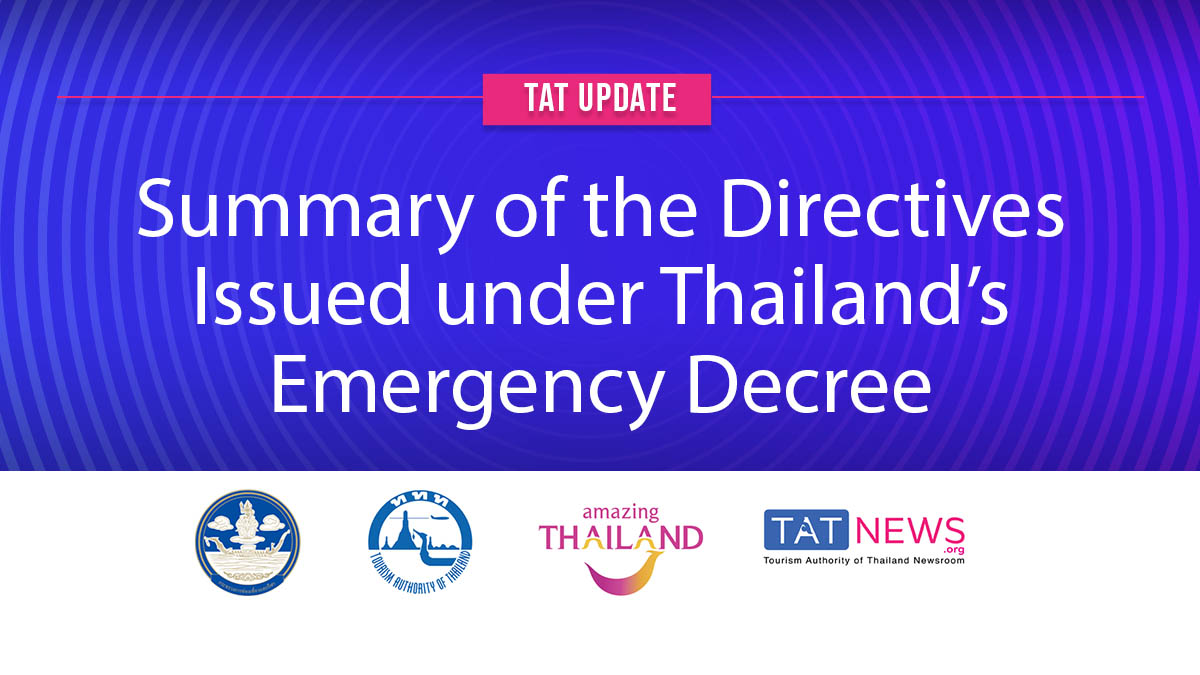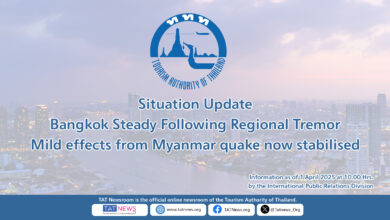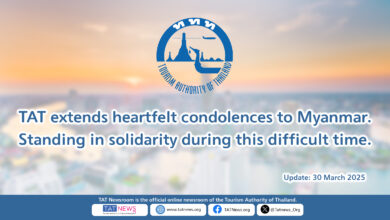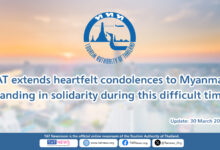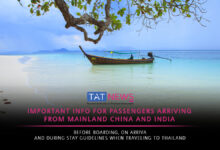Bangkok, 26 March, 2020 at 14.00 Hrs. – The Tourism Authority of Thailand (TAT) would like to inform international and domestic tourists of the directives issued following the Royal Thai Government’s declaration of the state of emergency from 26 March, 2020, onwards.
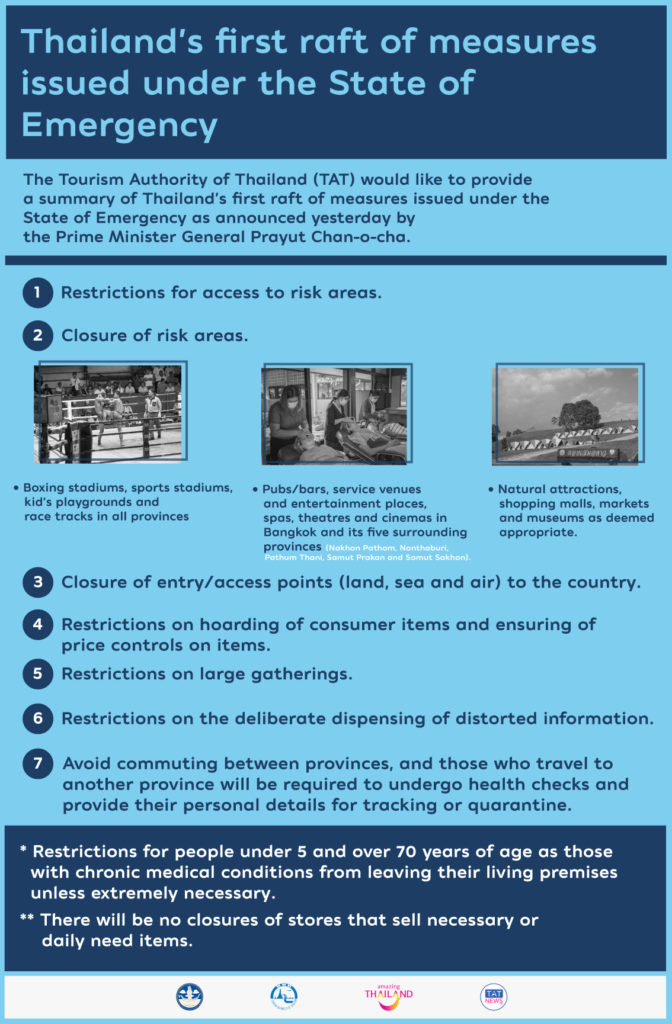
Summary of the Directives Issued under the Emergency Decree B.E. 2548 (2005)
Under the Emergency Decree B.E. 2548 (2005) to bring the emergency situation under control and to stop any deterioration of the situation any further, the following directives have been made:
No Entry to Hotspots
- Stay away from and do not enter any hotspots that might be a Coronavirus Disease 2019 (COVID-19) high risk throughout the country.
Spots Deemed Risky for Contagion
- All places for large public gatherings, which are considered a COVID-19 high risk are closed for business or activities. These include:
1) Boxing stadiums, sports arenas, tournament grounds, children’s playgrounds, and racetracks throughout the country;
2) Pubs, service establishments, entertainment venues, massage parlours, spas, fitness clubs, and other entertainment or health service facilities operating in Bangkok, Nonthaburi, Nakhon Pathom, Samut Prakan, and Samut Sakhon;
3) Other places including nature attractions, museums, public libraries, places of worship, transport terminals, markets, and department stores
may be ordered closed partially or entirely, as seen necessary.
Border Closure
- All transport vehicles including airplanes, boats, cars or any other type of vehicles are forbidden to enter the kingdom.
- All transport routes on air, water or land are closed.
- Exemptions for cross-border travel are as follows:
- 1) Deliverers of essential goods, who must return quickly upon completion of the task;
- 2) Drivers of vehicles, or attendants on vehicles entering with a clearly-defined mission and a definite timetable to leave the kingdom;
- 3) Diplomatic corps, staff attached to consulate generals, international organisations, government representatives with a mission in Thailand, or personnel attached to international organisations as permitted by the Ministry of Foreign Affairs, including family members of the said groups who must carry travel certificates or letters allowing temporary entry into the kingdom;
- 4) Aliens (non-residents) with work permits.
- Persons stated in Items 2- 4 must carry a fit-to-fly health certificate issued within 72 hours before departure. Upon entry into the kingdom they must follow the communicable disease control protocol as specified in Section 11.
- Immigration officials are empowered to deny entry to aliens who are infected with or suspected of contracting COVID-19, or who refuse screening.
Stockpiling of Commodities is Forbidden
- Stockpiling of essential goods is not allowed. This includes medical supplies, food, drinking water, or any other goods that are necessary for daily living.
- Increasing prices is strictly forbidden. Violators will be penalised accordingly.
Public Gatherings are Forbidden
- Public gatherings or organised activities involving people are prohibited.
News Broadcasts
- Scaremongers are warned not to spread false news or rumours concerning the COVID-19 pandemic through any media channels.
- Violators will be prosecuted under the Computer Crime Act B.E. 2550 (2007) or the Emergency Decree B.E. 2548 (2005).
Protection Measures for High-risk Groups
The following high-risk groups are strongly advised to self-isolate or shelter in their residence/accommodation and to avoid going out to public places to mitigate the risk of contracting COVID-19:
- Seniors over 70 years of age;
- Those with underlying health conditions (comorbidities), particularly non-communicable (chronic) diseases including diabetes, high blood pressure, cancer, chronic respiratory diseases (pulmonary diseases, allergies, asthma), cardiovascular diseases, and brain diseases. These individuals are already immunocompromised, and therefore highly susceptible to rapid worsening if infected with COVID-19;
- Small children under the age of 5 years.
- The above individuals may be allowed to go out to do essential business or errands – seeing a doctor, requiring healthcare, performing financial transactions, or other essential jobs involving telecommunications and post services, and dealings with the relevant authorities.
Leaving the Kingdom
- The Ministry of Foreign Affairs, Ministry of Interior, and Royal Thai Police will oversee the issuing of certificates, visas or permits that approve a continued stay in the kingdom for non-residents or expatriates without work permits.
- Non-residents who are not Thai nationals wishing to leave the kingdom shall be facilitated for the purpose.
Maintenance of Law and Order
- The Royal Thai Police shall set up road blocks and checkpoints on roads, transport routes, and bus terminals, as well as supervise travelling across provinces, manage traffic, and to keep on the lookout for symptoms in travellers and for risky behaviour that may result in contracting the disease.
Mitigation Strategies
- These are preventive preparations that you can take to slow the spread of the COVID-19 and protect high-risk individuals.
- 1) Clean contact surfaces of a place before beginning any activity.
- 2) Dispose of garbage daily.
- 3) All persons must wear a face mask.
- 4) Wash your hands with soap, or rub hands with alcohol-based hand sanitisers or disinfectant solutions.
- 5) All persons, seated or standing, must practice social distancing by maintaining a minimum distance of one metre between persons.
- If necessary, tracing applications on a mobile phone may be used to track the movement of some people ordered into a 14-day quarantine or self-isolation.
Facilities and Establishments to Remain Open
- Essential facilities and businesses will stay open as appropriate. These include hospitals, healthcare facilities, medical clinics, pharmacies, food shops that do not involve entertainment, food vendors, hotels (guest rooms), takeout food shops, small grocery stores, general trade shops, supermarkets, food courts and the essential goods section in a sizable department store, factories, securities businesses, finance institutions, banks, ATMs, markets and bazaars selling fresh and dried food, and other essential items for living, cooking gas shops, fuel and petrol stations, public transport, delivery trucks, and food orders with online delivery businesses.
- Government offices, state enterprise offices, and other state offices are open for business as usual at normal office hours, except those institutions that have already been closed, e.g., schools and colleges.
Cross Provincial Travel
- Stop or minimise any travel across provinces.
- As far as possible, stay and work at home/accommodation.
- If travelling across provinces, persons must be subject to screening and follow the official protocol for disease prevention.
Social Functions and Customs
- Social functions and customs and traditions can still be conducted, e.g., a wedding, ancestor worshipping, merit-making, or family gatherings.
Penalty
- Violators who defy or refuse to follow these directives shall be punished under Section 18 of the Emergency Decree B.E. 2548 (2005) and would be held responsible under Section 52 of the Communicable Disease Act B.E. 2558 (2015) or Section 41 of the Merchandise and Service Pricing Act B.E. 2542 (1999), as is the case.
